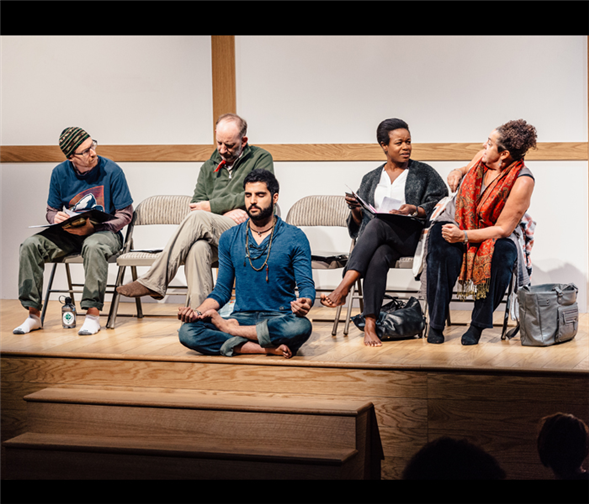Translate Page

In Small Mouth Sounds, words aren't necessary to tell a story
---
Small Mouth Sounds makes you realize how pushy most plays are, with their constant stream of words and arguments and bold-letter proclamations. That can be thrilling, of course, and nobody wants the characters in Shaw or Williams or Wasserstein to stop talking.
Still: Playwright Bess Wohl makes a stirring case for silence. Now at the Pershing Square Signature Center after appearing last year at Ars Nova, her play follows a silent meditation retreat in a secluded forest. A group of strangers arrives with sleeping bags and secret stashes of candy, hoping they can change their lives with a few days of calm. And for the most part, they stick to their vow of silence. Despite occasional outbursts, they explore the woods, navigate their sleeping arrangements, and even have arguments without saying a word.
But they're easy to understand. One of the joys of watching Small Mouth Sounds is discovering how much information is packed in gestures and facial expressions.
For instance, when Ned, a somewhat fussy man, notices his peace-and-love cabinmate is illegally burning incense, his raised eyebrows and pinched mouth tell us everything. Later on, when a woman accidentally asks a question aloud, her friend responds with a slow, somber shake of his head. Suddenly, we know exactly why he needed to get away for a while.
"Even though there's very little dialogue, very few words that we actually speak, we're communicating all the time," says Brad Heberlee, who plays Ned. "And we're listening all the time. I know that in any play you're listening, but because there are so few words, the listening is even more vital."
Take the scenes where the retreaters listen to their teacher. We hear his voice, but we never see him, which means we're always looking at the actors as they absorb the lessons. "The goal is to be present in the moment and clear about what you need from the teacher, or the people around you, or even yourself," says Heberlee. "Inevitably, of course, other thoughts enter my head as I'm sitting there, but I just have to let them pass. It's literally the same thing you're doing on a silent retreat. The actor's struggle and the character's struggle are the same!"
{Image1}
But there's also a freedom in the silence. At one pivotal moment, Ned writes something on a piece of paper and hands it to Alicia, a slightly scattered woman who seems to be dealing with a romantic problem. She reacts strongly to the note, and Ned clearly means what he's written. In most plays she'd probably read it aloud, and we'd know exactly what was passing between them. Here, though, we never learn what he writes. We just know it affects them both.
As an actor, Heberlee can scribble down whatever he wants, which means he gets to guide the play for a moment. "I don't write the same thing every day," he says. "It's always connected to my need as a character, but the specifics change. And I like knowing that [Zoë Winters, who plays Alicia] will read it, and it will be new for her as well. It keeps things alive."
It keeps things electric for the audience as well. "In the silence, it allows space for you to arrive at something for yourself," Heberlee says. "It feels communal. It feels like we come together as a group by the end of the evening, which is one of the goals of the play. People who arrive as observers and strangers can leave together as people who have gone through something."
---
TDF Members: At press time, discount tickets were available for Small Mouth Sounds. Go here to browse our current offers.
Follow Mark Blankenship at @IAmBlankenship. Follow TDF at @TDFNYC.
Photos by Ben Arons. Top photo: The cast of Small Mouth Sounds, with Brad Heberlee on the far left.